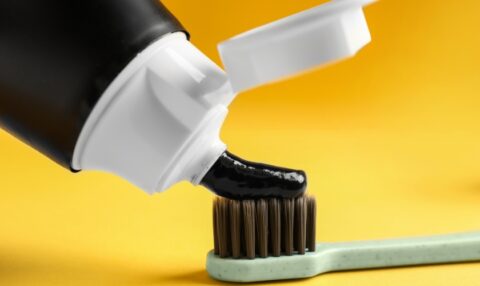
The Truth About Charcoal Toothpaste: Can it Really Whiten Your Teeth?
For many, the quest for a brighter smile is a constant one. In recent years, charcoal toothpaste has emerged as a popular alternative to traditional whitening products. But does this trendy paste actually work, and is it safe for your teeth? Let’s delve into the science behind charcoal toothpaste and explore its effectiveness in removing yellow teeth.Why Charcoal Toothpaste?
Activated charcoal, the key ingredient in these toothpaste, is a fine-grained powder derived from wood, coconut shells, or other organic materials. Proponents believe it acts like a magnet, attracting and absorbing surface stains caused by coffee, tea, red wine, and other common culprits.Does Charcoal Toothpaste Whiten Teeth?
The answer is somewhat murky. Charcoal toothpaste may offer some limited whitening benefits for surface stains. Its mildly abrasive nature can help physically scrub away these external discolorations. However, there’s a lack of strong scientific evidence to suggest it’s more effective than regular toothpaste. Here’s a deeper look at the limitations:- Ineffective on Intrinsic Stains: Charcoal doesn’t penetrate below the tooth’s enamel, where deeper, intrinsic stains reside. These stains are often caused by medications, aging, or underlying medical conditions.
- Potential for Abrasion: While the abrasiveness of charcoal toothpaste can remove surface stains, it can also wear down tooth enamel over time. This can actually make teeth appear more yellow by exposing the underlying dentin, a naturally yellow layer beneath the enamel.
How Long Does it Take for Charcoal Toothpaste to Whiten Teeth?
Even for mild surface stains, any whitening effects from charcoal toothpaste are likely to be subtle and gradual. There’s no definitive timeframe for noticeable results, and the effectiveness can vary depending on the severity of stains and individual oral hygiene practices.Is it OK to Brush Your Teeth with Charcoal Toothpaste?
While charcoal toothpaste generally isn’t harmful for occasional use, there are some potential downsides to consider:- Sensitivity: The abrasiveness of charcoal can irritate gums and cause tooth sensitivity, especially for those with sensitive teeth.
- Enamel Erosion: Long-term use can erode tooth enamel, leaving teeth vulnerable to cavities and chips.
- Fluoride Removal: Some charcoal toothpastes may lack fluoride, a crucial mineral for preventing cavities.
Alternatives for a Brighter Smile
If you’re looking for a more effective and long-lasting solution for yellow teeth, consider these options:- Professional In-Office Teeth Whitening: This is the gold standard for whitening and offers the most dramatic results. A dental professional will use a powerful bleaching agent to lighten both surface and intrinsic stains. The results are typically quicker and more predictable than at-home treatments.
- Whitening Toothpaste with Fluoride: Look for a toothpaste containing fluoride and approved by the American Dental Association (ADA). These pastes gently remove surface stains while strengthening enamel and preventing cavities.
- Lifestyle Changes: Limiting consumption of staining foods and beverages, quitting smoking, and practicing good oral hygiene can all contribute to a whiter smile.